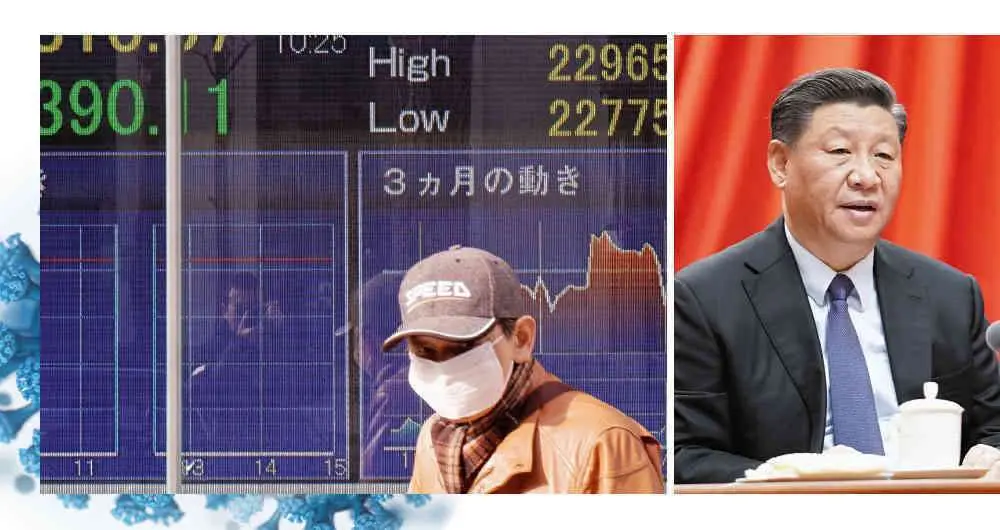How to turn the world upside down

If one of the conspiracy theories circulating on the web were true, the United States would have dealt a major blow to China, the emerging power disputing its primacy. When and where the coronavirus originated, now spreading around the world, more because of collective hysteria than because of the number of victims it is leaving, is the question that feeds the sort that the virus could have been manufactured and spread as a weapon of war.
Whether or not it is the fruit of fantasy, the fact is that the world's second largest economy has been almost completely at a standstill for more than a month, passing on this decline to all the countries with which it has human and trade relations. The International Monetary Fund is forecasting a significant decline, from 6.5% to 5.6%, in China's growth for this very year 2020, and that is counting on the epidemic being brought under control in the next few days.
The so-called "world factory" has stopped the production and supply of all kinds of products, from textiles and shoes to cars and mobile phones. China is also experiencing a sharp decline in electricity production, much of which is, incidentally, coal-based. Its giant steel mills, which supply themselves with iron usually supplied by Brazil and Australia, are also paralyzed. The fact that China consumes 40% of the annual production of metals therefore shatters African and Latin American exports of such raw materials, which has a decisive impact on the economies of their continents, with its brutal consequences on their respective social balances, which are already quite fragile.
Most of these products are transported by sea, with the result that world trade is slowing down considerably. The daily index that tracks the rates imposed on the 20 global dry bulk routes, the Baltic Dry Index (BDI), recorded its lowest historical levels in the last days of February, especially for the "capesize" category, which contains the largest merchant ships. China accounts for 35% of total world dry bulk imports. Of course, almost all Chinese ports are paralyzed, and obviously their lack of activity is spread to ports around the world where goods are shipped to China.
The economic catastrophe is most instantly reflected in the virulent reality of the collapse of the stock markets. The European stock markets lost almost 5% in a single day (20.9 billion euros for Spain) when the first victims appeared in Italy, but the contagion was practically widespread in all the financial markets, led by London, New York, Singapore and Hong Kong.
Were there sufficient reasons and real causes for such a debacle? Based on the numbers of people infected and killed by the coronavirus, it does not appear so: 80,000 sick and so far 2,800 dead, mostly elderly people suffering from other ailments. If we take into account that the common flu infects more than 100 million people every year with between 350,000 and 600,000 deaths, of which some 850,000 are infected and 6,500 have died in Spain (2019 figures), it seems that the global hysteria unleashed is unjustified.
As in any war, even if it is against a microbe, there are some who multiply their profits exponentially in the face of the big economic losers. A simple example is the multiplication by ten or twenty times of the price of masks or disinfectant gels. The laboratory that finds a vaccine that defeats the coronavirus, and it seems that the discovery is not far off, will make its owners even more billionaires if they manage to maintain hysteria and tension, and thus force governments to pay any price and provide them to their citizens-voters. Then, once the storm has passed and the bill has been paid, it may not be a big deal, but nobody will remember it anymore. Where are those four million vaccines, purchased by the Spanish Government, then headed by Rodríguez Zapatero, to deal with the bird flu, which vanished a few days later as if by magic?
This dramatic episode, whose overall economic cost could reach 25 billion euros (the equivalent of the European Union's budget for almost a quarter of a century), also serves to dust off old stories of anticipation. A colleague from the International Press Club of Madrid, Carmen Chamorro, shares on the net her discovery of Dean Koontz's 1981 story, "The Eyes of Darkness", in which a virus, coincidentally named Wuhan-400, becomes a terrifying weapon of war.
In the midst of all this, good news for environmentalism: the slowdown in China's economic activity has reduced the Asian giant's daily polluting emissions into the atmosphere by no less than 30%, a significant but unintended contribution to the fight against climate change. The worst news, however, is the intensification of the repression against Chinese dissidents, especially in the Uyghur regions, with the authorities of the regime taking advantage of draconian measures of confinement and quarantine.
But, going back to the beginning and speculating again on the above mentioned conspiracy theory, there is no doubt that the global fighting power would have won this battle over its great competitor without firing a single shot, although with monumental collateral damages.

